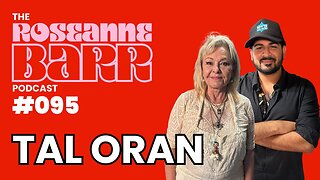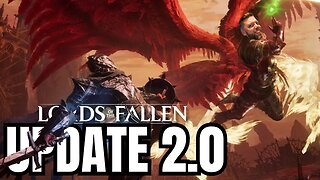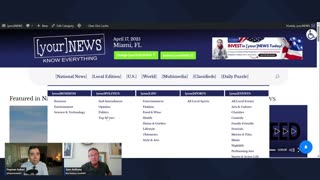Premium Only Content

Hitler's Speech in Munich - April 10, 1923
Background Leading Up to Hitler's Speech in Munich - April 10, 1923
Post-World War I Germany: In the early 1920s, Germany was grappling with the severe economic and political fallout from World War I and the Treaty of Versailles. The harsh reparations and territorial losses imposed by the treaty had caused widespread resentment and economic hardship.
Economic Crisis: The hyperinflation crisis was in full swing, devastating the German economy. The value of the German mark had plummeted, leading to skyrocketing prices and financial instability. This economic turmoil created fertile ground for extremist political movements.
Rise of the Nazi Party: Adolf Hitler and the National Socialist German Workers' Party (NSDAP) were gaining traction by capitalizing on public discontent. The party's nationalist and anti-Weimar rhetoric appealed to many Germans who were frustrated with the current state of the nation.
Key Points of Hitler's Speech:
Critique of the Weimar Republic: Hitler began by sharply criticizing the Weimar Republic, blaming it for Germany's economic woes and political instability. He accused the government of being weak and incapable of addressing the nation's problems.
Condemnation of the Treaty of Versailles: A central theme of Hitler's speech was the denunciation of the Treaty of Versailles. He argued that the treaty was an unjust imposition on Germany, responsible for its economic hardship and loss of national pride.
Call for National Revival: Hitler called for a revival of German nationalism and unity. He emphasized the need to restore Germany's honor and to reclaim its rightful place in the world. This included repudiating the terms of the Versailles Treaty and rebuilding the nation.
Economic Solutions: Hitler presented his vision for economic recovery, which involved rejecting reparations and revitalizing German industry. He argued that only a strong, nationalist government could achieve economic stability and prosperity.
Appeal for Support: Hitler urged his audience to join the Nazi movement and to support its efforts to bring about national renewal. He stressed the importance of political activism and unity in achieving their goals.
Analysis:
Attack on the Republic: Hitler’s critique of the Weimar Republic aimed to undermine its legitimacy and to position the Nazi Party as the only viable alternative. By blaming the government for Germany's problems, he sought to attract support from disillusioned citizens.
Anti-Treaty Rhetoric: The condemnation of the Treaty of Versailles was a recurring theme in Hitler's speeches. By portraying the treaty as a source of national humiliation and economic suffering, he aimed to rally nationalist sentiment and to justify his expansionist ambitions.
Nationalist Appeal: Emphasizing national revival and unity, Hitler sought to inspire a sense of duty and pride among his audience. His vision for Germany’s future was designed to resonate with those longing for a return to strength and stability.
Economic Promises: By offering solutions to the economic crisis, Hitler aimed to gain the support of those suffering from hyperinflation and unemployment. His promises of economic recovery and stability were crucial in attracting a broad base of support.
Mobilization of Supporters: The appeal for support was a strategic move to build the Nazi movement. Hitler stressed the importance of collective effort and activism, aiming to mobilize his followers and to prepare them for future political battles.
Overall, Hitler's speech on April 10, 1923, was a powerful articulation of his nationalist and anti-Weimar ideology. It sought to rally support for the Nazi Party by capitalizing on economic hardship, critiquing the Treaty of Versailles, and presenting a vision of national revival and strength.
-
 2:03:46
2:03:46
Roseanne Barr
4 hours ago $11.94 earned"God, Go Get em' Honey" W/ Tal Oran | The Roseanne Barr Podcast #95
68.6K32 -
 LIVE
LIVE
BSparksGaming
4 hours agoLords of the Fallen Version 2.0 Gameplay!
40 watching -
 1:04:45
1:04:45
Donald Trump Jr.
7 hours agoThe Left’s Lunacy Knows No Bounds, Plus Taking Your Questions Live! | Triggered Ep234
106K134 -
 LIVE
LIVE
Rebel News
11 hours ago $10.45 earnedLIVE: Rebels react as leaders face off in Day 2 English debate
2,279 watching -
 LIVE
LIVE
Phyxicx
5 hours agoMore Halo I guess - 4/17/2025
121 watching -
 37:56
37:56
Michael Franzese
5 hours agoThe Man Who Invented the Mafia: Lucky Luciano
39.6K12 -
 LIVE
LIVE
Jokeuhl Gaming and Chat
2 hours agoEmpyrion - Galactic Survival
69 watching -
 1:06:13
1:06:13
In Lay Terms
10 hours agoSam Anthony | EP 190 | Decentralizing Media, Empowering Citizen Journalism, and Expanding North
36 -
 LIVE
LIVE
Joker Effect
1 hour agoSome people think @PlayMotherland and @IGGYAZALEA are lit... those who do are cool in my book
283 watching -
 DVR
DVR
megimu32
4 hours agoON THE SUBJECT: Oops! The Internet Was Funny Before Feelings Got Involved
12.6K